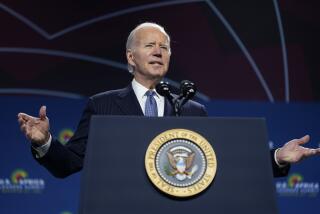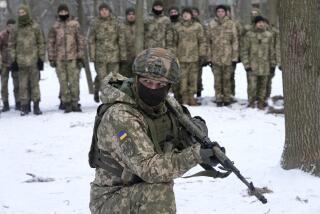Obama says U.S. will keep working for Kadafi ouster
- Share via
Reporting from Washington and London — President Obama vowed Friday that the United States would continue “slowly tightening the noose” to force Libyan leader Moammar Kadafi from power, but also made it clear that the U.S. would proceed cautiously on any potential military operation.
Obama, at a White House news conference, said his administration planned to name a special envoy to determine ways to assist the anti-Kadafi rebels. Secretary of State Hillary Rodham Clinton is scheduled to meet with representatives of the Libyan opposition during a trip next week to Europe and the Middle East.
Obama emphasized that he does not take decisions on military action lightly.
“When it comes to military actions, whether it’s a no-fly zone or other actions, you’ve got to balance costs versus benefits,” he said.
Separately, leaders of the European Union unanimously called on Kadafi to give up power and said they would examine “all necessary options” to protect Libyan civilians from attack. Leaders of the 27-member bloc were gathered in Brussels for an emergency summit to discuss the situation.
In Libya, “the problem has a name — Kadafi — and he must go,” said Jose Manuel Barroso, president of the European Commission, the EU’s executive arm. “Time is running out, so we have to intensify our international pressure on the current regime to step down.”
The EU said it regarded opposition leaders based in the eastern Libyan port city of Benghazi as credible political interlocutors. But it stopped short of following France’s move to formally recognize the rebels as Libya’s legitimate authority and to exchange ambassadors.
That decision, announced Thursday by French President Nicolas Sarkozy, caused some irritation among fellow European leaders, who felt Sarkozy had jumped the gun.
The EU tightened its economic sanctions on Libya by freezing more assets of the Kadafi regime, and it said it would offer more financial incentives to governments in the region to implement democratic reforms.
In Tripoli, the Libyan capital, antigovernment protesters scheduled demonstrations after Friday prayers, but Kadafi supporters carrying weapons kept journalists away from the areas where demonstrations were planned.
Thirty miles west of the capital, the city of Zawiya appeared largely deserted except for heavily armed security forces and a few hundred government supporters. The city was held by opposition supporters for weeks before it was retaken by Kadafi forces this week in a ferocious barrage of airstrikes and artillery fire.
In the eastern city of Port Brega, where rebels held an oil complex, antigovernment fighters vowed to stand their ground.
“We’ll fight and die right here,” said Montassar Rahani, 23.
Times staff writers Peter Nicholas in Washington, David Zucchino in Port Brega and Borzou Daragahi in Zawiya and special correspondent Kim Willsher in Paris contributed to this report.
More to Read
Get the L.A. Times Politics newsletter
Deeply reported insights into legislation, politics and policy from Sacramento, Washington and beyond. In your inbox twice per week.
You may occasionally receive promotional content from the Los Angeles Times.












